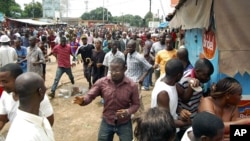Since gaining independence from France in 1958, the West African nation of Guinea has endured many setbacks on the road to democratic governance. The country has faced a history of autocratic rulers and military coups that have violated human rights, suppressed political debate and free expression. In perhaps the greatest outrage, five years ago security forces massacred peaceful protestors at an opposition rally in the capital, Conakry.
Since then, Guineans democratically elected a president and legislature and are taking steps to build democratic institutions. Sadly though, little progress has been made to hold the perpetrators of the massacre accountable and provide justice to the victims.
While a panel was established to investigate these crimes, and four high level indictments were handed down, the convocations and summons issued by this panel have not been respected, and no one has been brought to justice. A request by the panel of judges to interview Guinea’s former leader in exile in Burkina Faso has been outstanding for several years, and we encourage the Government of Guinea to work with the government of Burkina Faso to ensure that the Guinean panel is able to conduct its requested interview. We also encourage the Government of Guinea to place Lt Col. Claude Pivi and Col. Moussa Camara, who were both indicted for their alleged role in the massacre, on administrative leave pending conclusion of the investigation.
The violence erupted on September 28, 2009, when members of the elite presidential guard fired on a crowd of thousands gathered in a sports stadium. They had turned out to protest against Captain Moussa Dadis Camara, the leader of the military junta that took power in December 2008, and his candidacy in January 2010 elections. Security forces tried to disrupt the rally by firing tear gas into the crowd and, when panic ensued, they began indiscriminately firing at unarmed civilians. Rally leaders were arrested, at least 150 people were killed, and more than 100 women were raped and suffered other forms of sexual abuse. Camara was later wounded in an assassination attempt.
Even while the United States rallies the world to support Guinea and its neighbors in responding to and stopping the devastating Ebola outbreak, we continue to call on the government there to hold accountable those responsible and urge all members of the security forces to fully cooperate with the investigation.

















